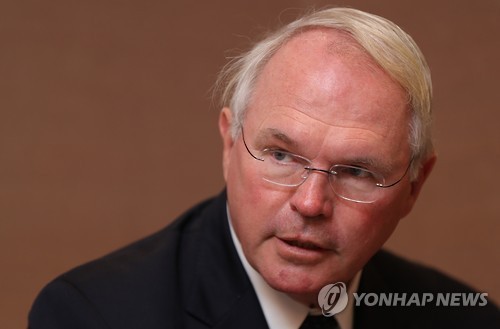South Korea is likely to see the emergence of a "left-of-center" government that is more accommodating to North Korea and less willing to follow the US lead, former US Ambassador to South Korea Christopher Hill said.
South Korea is scheduled to elect a new president in May after former President Park Geun-hye was forced out of office in the wake of a massive corruption scandal involving a longtime friend accused of using her ties to Park to amass wealth and other personal gains.
 |
(Yonhap) |
"The betting is that the left of center government there, left of center party, will probably come in. So left of center in Korea means more nationalism ... more kind of accommodating to North Korea, a little less willing to follow our lead," Hill said in an interview with CBS.
"So there are going to be issues there as we going forward," he said.
The remark reflects concerns in the United States about potential strains in the Korea-US relations in case South Korea elects a liberal candidate who seeks a softer approach to a nuclear-armed North Korea and closer ties with China amid tensions over the US deployment of the THAAD missile defense system in the South.
The outright front-runner in South Korea's presidential race is Moon Jae-in, a human rights lawyer-turned-politician who served as chief of staff to former late President Roh Moo-hyun. Moon lost to Park in the 2012 presidential vote.
Moon said in a recent interview with The New York Times that the alliance with the US is "a pillar of our diplomacy," but he also said that South Korea should learn to "say 'No' to the Americans."
He also voiced criticism of the hard-line approach the Park government took to the North, arguing that a decade of sanctions failed to stop North Korea's nuclear weapons program so it was time to embrace Pyongyang as a dialogue partner.
Moon also said he would reopen the joint venture industrial complex in the North that the Park government shut down in the wake of the North's fourth nuclear test last year. The Kaesong factory park had been touted as a symbol of reconciliation but was also accused of providing hard currency to Pyongyang. (Yonhap)






![[Herald Interview] 'Trump will use tariffs as first line of defense for American manufacturing'](http://res.heraldm.com/phpwas/restmb_idxmake.php?idx=644&simg=/content/image/2024/11/26/20241126050017_0.jpg)
![[Exclusive] Hyundai Mobis eyes closer ties with BYD](http://res.heraldm.com/phpwas/restmb_idxmake.php?idx=644&simg=/content/image/2024/11/25/20241125050044_0.jpg)
